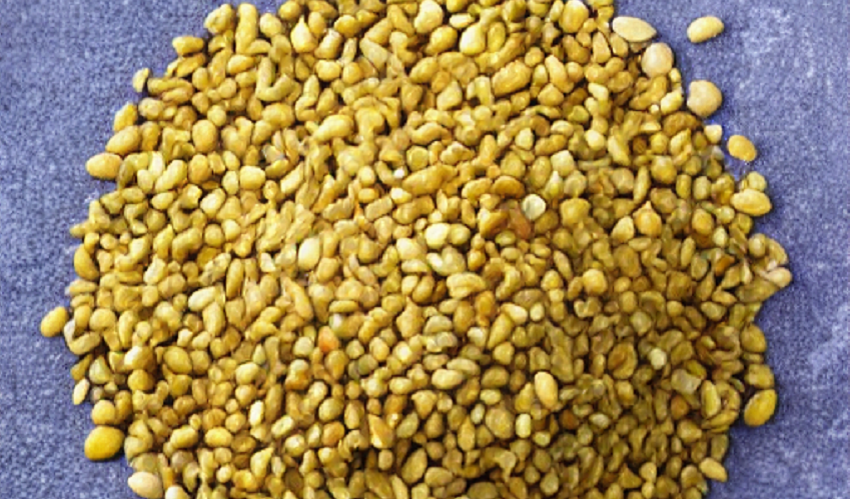What are fenugreek seeds?
Fenugreek seeds are small, golden-brown seeds that come from the fenugreek plant, which is native to the Mediterranean region. These seeds have been used for centuries in traditional medicine and cooking due to their numerous health benefits. Fenugreek seeds are rich in fiber, protein, and various vitamins and minerals, making them a nutritious addition to any diet. They are also known for their potential to help manage diabetes. Fenugreek seeds contain compounds that can help lower blood sugar levels, improve insulin sensitivity, and reduce the risk of complications associated with diabetes. Additionally, they may aid in weight management and promote heart health. Incorporating fenugreek seeds into your diet can be as simple as adding them to your meals, using them as a spice, or taking them in supplement form. However, it is important to consult with a healthcare professional before making any significant changes to your diabetes management plan.
How do fenugreek seeds help with diabetes?
Fenugreek seeds have been used for centuries as a natural remedy for various health conditions, including diabetes. These small, brown seeds are rich in fiber, which helps slow down the absorption of sugar in the bloodstream. This can help regulate blood sugar levels and prevent sudden spikes or drops. Additionally, fenugreek seeds contain compounds that may enhance insulin sensitivity, making it easier for the body to utilize and regulate insulin. Studies have shown that consuming fenugreek seeds regularly can lead to improved glycemic control in individuals with diabetes. Furthermore, fenugreek seeds have anti-inflammatory properties that can help reduce inflammation in the body, which is beneficial for managing diabetes-related complications. Overall, incorporating fenugreek seeds into a balanced diet can be a natural and effective way to support diabetes management.
Research on fenugreek seeds and diabetes
Research on fenugreek seeds and diabetes has shown promising results. Several studies have found that fenugreek seeds can help regulate blood sugar levels in individuals with diabetes. The seeds contain compounds that have anti-diabetic properties, such as soluble fiber and saponins. These compounds can slow down the absorption of carbohydrates, preventing rapid spikes in blood sugar levels. Additionally, fenugreek seeds have been found to improve insulin sensitivity, allowing the body to use insulin more effectively. Overall, incorporating fenugreek seeds into the diet may be a beneficial strategy for managing diabetes and improving blood sugar control.
Blood sugar control
Effect of fenugreek seeds on blood sugar levels
Fenugreek seeds have been found to have a significant effect on blood sugar levels in individuals with diabetes. Several studies have shown that consuming fenugreek seeds can help lower fasting blood glucose levels and improve insulin sensitivity. This is due to the presence of soluble fiber and certain compounds in fenugreek seeds that help regulate blood sugar levels. Additionally, fenugreek seeds have been found to reduce post-meal blood sugar spikes, making them a valuable addition to a diabetes management plan. Incorporating fenugreek seeds into the diet may provide a natural and effective way to control blood sugar levels and improve overall glycemic control in individuals with diabetes.
Mechanism of action
The mechanism of action of fenugreek seeds in managing diabetes is multifaceted. Firstly, fenugreek seeds contain soluble fiber, which helps slow down the digestion and absorption of carbohydrates. This results in a slower and more controlled release of glucose into the bloodstream, preventing sudden spikes in blood sugar levels. Secondly, fenugreek seeds have been found to increase insulin sensitivity, allowing the body to use insulin more effectively. This can help improve glucose uptake by cells and promote better blood sugar control. Additionally, fenugreek seeds have been shown to inhibit the activity of certain enzymes involved in carbohydrate metabolism, further contributing to their antidiabetic effects. Overall, the mechanism of action of fenugreek seeds involves regulating carbohydrate digestion and absorption, enhancing insulin sensitivity, and inhibiting carbohydrate-metabolizing enzymes, all of which contribute to improved blood sugar management in individuals with diabetes.
Dosage and usage recommendations
When it comes to the dosage and usage of fenugreek seeds for diabetes, it is important to consult with a healthcare professional or a registered dietitian. The recommended dosage may vary depending on individual needs and health conditions. Generally, it is advised to start with a small amount, such as 1-2 teaspoons of fenugreek seeds per day, and gradually increase the dosage over time. It is also important to note that fenugreek seeds can be consumed in various forms, including as a spice in cooking, as a supplement in capsule or powder form, or as a tea. However, it is crucial to monitor blood sugar levels regularly and make any necessary adjustments to the dosage or usage based on the guidance of a healthcare professional. Fenugreek seeds can be a beneficial addition to a diabetes management plan, but it is always best to seek professional advice to ensure safe and effective usage.
Insulin sensitivity
Improvement in insulin sensitivity
Fenugreek seeds have been found to have a positive impact on insulin sensitivity, making them beneficial for individuals with diabetes. Insulin sensitivity refers to how well the body’s cells respond to insulin, the hormone responsible for regulating blood sugar levels. Studies have shown that consuming fenugreek seeds can help improve insulin sensitivity, leading to better blood sugar control. This is particularly important for individuals with diabetes, as insulin resistance is a common problem in this condition. By incorporating fenugreek seeds into their diet, individuals with diabetes can potentially enhance their body’s ability to use insulin effectively, resulting in improved glucose metabolism and overall better management of the disease.
Regulation of glucose metabolism
Fenugreek seeds have been found to play a significant role in the regulation of glucose metabolism, making them a valuable addition to the diet of individuals with diabetes. These seeds contain a compound called galactomannan, which has been shown to slow down the absorption of sugar in the stomach and stimulate the production of insulin. This helps to maintain stable blood sugar levels and prevent sudden spikes or drops. Additionally, fenugreek seeds have been found to improve insulin sensitivity, allowing the body to use insulin more effectively. This can lead to better control of blood sugar levels and reduced risk of complications associated with diabetes. Incorporating fenugreek seeds into the diet can be a natural and effective way to manage diabetes and promote overall health.
Effects on insulin resistance
Fenugreek seeds have been found to have a positive impact on insulin resistance, making them beneficial for individuals with diabetes. Insulin resistance occurs when the body’s cells become less responsive to the hormone insulin, which is responsible for regulating blood sugar levels. Studies have shown that fenugreek seeds can help improve insulin sensitivity, allowing cells to effectively absorb glucose from the bloodstream. This can help lower blood sugar levels and improve overall glycemic control in individuals with diabetes. Additionally, fenugreek seeds have been found to reduce fasting blood sugar levels and improve post-meal glucose tolerance. These effects on insulin resistance make fenugreek seeds a promising natural remedy for managing diabetes.
Weight management
Role of fenugreek seeds in weight loss
Fenugreek seeds have gained popularity for their potential role in weight loss. These seeds are rich in soluble fiber, which helps to promote feelings of fullness and reduce appetite. Additionally, fenugreek seeds contain compounds that may help to regulate blood sugar levels and improve insulin sensitivity, which can be beneficial for weight management. Studies have shown that consuming fenugreek seeds or supplements may lead to reduced body weight, body fat percentage, and waist circumference. However, it is important to note that fenugreek seeds should be used in conjunction with a balanced diet and regular exercise for optimal weight loss results.
Appetite suppression
Fenugreek seeds have been found to have appetite-suppressing properties, making them a beneficial addition to the diet of individuals with diabetes. These seeds contain a soluble fiber called galactomannan, which forms a gel-like substance in the stomach, promoting a feeling of fullness and reducing the desire to overeat. By curbing excessive hunger and cravings, fenugreek seeds can help individuals with diabetes maintain a healthy weight and manage their blood sugar levels more effectively. Additionally, the high fiber content of fenugreek seeds slows down the absorption of carbohydrates, preventing sudden spikes in blood sugar levels. Incorporating fenugreek seeds into the diet can be a natural and effective way to support appetite suppression and overall diabetes management.
Impact on body composition
Fenugreek seeds have been found to have a positive impact on body composition, making them a beneficial addition to the diet of individuals with diabetes. Studies have shown that fenugreek seeds can help to reduce body fat percentage and increase lean muscle mass. This is important for individuals with diabetes, as maintaining a healthy body composition can help to improve insulin sensitivity and blood sugar control. Additionally, fenugreek seeds have been found to have appetite-suppressing properties, which can aid in weight management for individuals with diabetes. Incorporating fenugreek seeds into the diet can be a simple and effective way to support overall body composition and diabetes management.
Cardiovascular health
Reduction in cholesterol levels
Fenugreek seeds have been found to be effective in reducing cholesterol levels. Several studies have shown that consuming fenugreek seeds can lead to a significant decrease in both total cholesterol and LDL (bad) cholesterol levels. This is attributed to the high fiber content in fenugreek seeds, which helps to bind cholesterol and remove it from the body. Additionally, fenugreek seeds contain compounds like saponins and flavonoids that have been shown to inhibit the absorption of cholesterol in the intestines. Including fenugreek seeds in your diet may be a natural and effective way to lower cholesterol levels and improve heart health.
Lowering of blood pressure
Fenugreek seeds have been found to have a positive effect on lowering blood pressure. Several studies have shown that fenugreek seeds contain compounds that can help relax blood vessels, leading to a decrease in blood pressure. These seeds also have diuretic properties, which can help remove excess fluid from the body and further contribute to reducing blood pressure. Additionally, fenugreek seeds have been shown to improve lipid profiles, including reducing cholesterol levels, which can also have a positive impact on blood pressure. Incorporating fenugreek seeds into a balanced diet may be a beneficial strategy for individuals looking to manage their blood pressure levels.
Prevention of heart disease
Fenugreek seeds not only offer numerous benefits for diabetes management but also play a significant role in the prevention of heart disease. Research has shown that fenugreek seeds can help lower cholesterol levels, reduce blood pressure, and improve overall heart health. The high fiber content in fenugreek seeds helps to reduce the absorption of cholesterol in the bloodstream, thus reducing the risk of plaque buildup in the arteries. Additionally, fenugreek seeds contain compounds that have antioxidant properties, which can protect the heart from oxidative stress and inflammation. Incorporating fenugreek seeds into a balanced diet can be a natural and effective way to promote heart health and reduce the risk of heart disease.
Summary of the benefits of fenugreek seeds for diabetes
Fenugreek seeds have been found to have numerous benefits for individuals with diabetes. These small, yellowish-brown seeds are rich in fiber, which helps regulate blood sugar levels and improve insulin sensitivity. Additionally, fenugreek seeds contain compounds that have been shown to reduce cholesterol levels and improve heart health, reducing the risk of cardiovascular complications associated with diabetes. Moreover, fenugreek seeds have anti-inflammatory properties that can help alleviate symptoms of diabetes-related inflammation. Overall, incorporating fenugreek seeds into a diabetic diet can be a beneficial and natural way to manage blood sugar levels and improve overall health.
Importance of incorporating fenugreek seeds into a diabetes management plan
Incorporating fenugreek seeds into a diabetes management plan can be highly beneficial. Fenugreek seeds are known to have anti-diabetic properties, which can help regulate blood sugar levels. They contain soluble fiber, which slows down the absorption of carbohydrates and sugars, preventing sudden spikes in blood sugar. Fenugreek seeds also contain compounds that improve insulin sensitivity and reduce insulin resistance. Additionally, they have been found to lower cholesterol levels and improve heart health, which is important for individuals with diabetes who are at a higher risk of cardiovascular diseases. Including fenugreek seeds in the diet can be an effective way to manage diabetes and improve overall health.
Future research and potential applications
Future research on the benefits of fenugreek seeds for diabetes is essential in order to fully understand their potential applications. Further studies could explore the specific mechanisms by which fenugreek seeds exert their positive effects on blood sugar control and insulin sensitivity. Additionally, investigating the optimal dosage and duration of fenugreek seed supplementation could provide valuable insights for diabetes management. Furthermore, exploring the potential synergistic effects of fenugreek seeds with other natural remedies or conventional diabetes medications could open up new possibilities for integrated treatment approaches. Overall, future research in this area has the potential to contribute significantly to our understanding of fenugreek seeds’ role in diabetes prevention and management.




